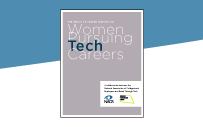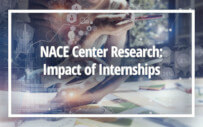
In spring 2025, NACE conducted a follow-up poll to a 2023 survey to better understand the current mental health concerns of NACE members. In the latest poll, more than half of participants self-reported that their mental health was worse at the time of the poll than it was last year at the same time.

There has been much discussion about whether a degree is necessary for every job. The answer is “no.” About half of employers responding to NACE’s Job Outlook 2025 Spring Update survey said their organization has positions that are flexible in terms of degree.

Research conducted by Mary Scott shows candidates’ increasing “lack of enthusiasm” about employer use of AI as a screening tool.

What do Class of 2025 college graduates want most in a job? According to NACE’s annual student survey, they are looking for stability. They also would like a healthy workplace culture and friendly coworkers.

Almost two-thirds of employers responding to NACE’s Job Outlook 2025 Spring Update survey reported using skills-based hiring to help them identify candidates with potential.

Hybrid and in-person remain the preferred work modalities of employers for both their overall and entry-level positions, which matches the ways students prefer to work, NACE research has found.

Although overall hiring projections are up just 0.6% from last year, nearly 90% of employers anticipate increasing or maintaining hiring for the college Class of 2025, according to NACE’s Job Outlook 2025 Spring Update.

In-person activities are the most widely used and effective means for recruiting interns, according to results of NACE’s 2025 Internship & Co-op survey.

More than 70% of organizations expect to increase or maintain intern hiring, according to NACE’s 2025 Internship & Co-op Report. However, overall intern hiring is expected to fall 3.1%.

The average hourly wage for bachelor’s degree level interns has increased each year over the past 10 years and now stands at $23.04, according to NACE’s 2025 Guide to Compensation for Interns & Co-ops.

Career center budgets for the 2024-25 academic year have increased across the board since 2022-23, according to results of NACE’s 2024-25 Career Services Benchmarks survey.

Class of 2025 engineering and business graduates at the master’s degree level are expected to see salaries climb 12.5% and 3.1%, respectively, according to results of NACE’s Winter 2025 Salary Survey.

Overall, starting salary projections for the Class of 2025 are something of a mixed bag as projected movement in salaries ranges from a gain of 2.8% for agriculture and natural resources to a decrease of 3.6% for the social sciences.

Over the past five years—and maybe because they weathered the pandemic and got a giant taste of how quickly things can change—new grads’ wish list has largely reflected one thing: their desire for security.

When students responding to NACE’s 2024 Student Survey were asked to identify the obstacles preventing them from participating in internships, their responses revealed they attributed their decision to a lack of time, concerns over pay, and scant opportunities.

There are several factors linked to the decision to convert for Class of 2024 graduating seniors, according to results of NACE’s 2024 Student Survey.

There is a clear and persistent disconnect between how students and employers perceive students’ development of the competencies they need to be career ready as they enter the workforce.

College students from the Class of 2025 looking to enter the job market should highlight on their resumes the attributes and skills they developed in their classwork and through their various experiential assignments. But which attributes and skills are most important to employers?

Data suggest that providing interns with relocation assistance correlates to better conversion rates for organizations that hope to turn interns into full-time hires.

Close to two-thirds of employers responding to the Job Outlook 2025 survey reported that they use skills-based hiring practices for new entry-level hires, and more than half use these practices always or most of the time in their hiring process.

Hiring for the college Class of 2025 is expected to increase 7.3% over hiring for the Class of 2024, according to NACE’s Job Outlook 2025 survey.

Nearly 85% of Class of 2023 bachelor’s degree graduates and nearly 90% of master’s degree graduates were employed or engaged in further education within six months of graduation.

While some of the experiences of nontraditional-aged students mirror those of their traditional-aged peers, there are important areas where they diverge. This information can help career service professionals and recruiters better serve this growing group of college students.

Graduating students weighing job offers heavily consider the cost of living in each job’s location when making their decision, according to NACE’s 2024 Student Survey report.

Career fairs are relatively effective means for students to convert connections into jobs, according to NACE’s 2024 Student Survey report.

The percent of graduating seniors who participated in an internship is the highest that NACE has recorded in the past six years, according to results of NACE’s 2024 Student Survey.

When done right, execution—meeting or exceeding students’ expectations throughout their candidate experience—helps drive success in early talent recruiting.

Because faculty are frequently asked by their current and former students for career advice, there is an opportunity to increase awareness among faculty of the resources available to them.

Salaries for college graduates overall continue to climb as, for the second straight year, the increase in average salary for a graduating class has surpassed 7%.

There are interesting data points from NACE’s 2024 Recruiting Compensation Report in terms of budgets, internship offers, and retention that provide insight into the operations and approaches of URR functions.

Recruiters are taking more time to extend an offer to a candidate following an interview, but the deadline for acceptance remains close to two weeks.

The political and social unrest seen on college campuses last spring and that may potentially reignite this fall has little impact on college recruiting, according to results of a recent NACE quick poll.

Lifted by average increases that ranged between 3.5% and 4.4%, salaries for all recruiting professionals increased in 2023, while the majority of respondents at all levels received bonuses.

Nearly 90% of the college Class of 2024 indicated that their institution prepared them for the next step in their career, according to results of NACE’s 2024 Student Survey.

The college Class of 2024 is looking for economic security in a job, according to results of NACE’s annual student survey.

While nearly 20% of employers that responded to NACE’s Job Outlook 2024 Spring Update survey have had discussions about removing the college degree as a key requirement for entry-level positions, nearly 80% of respondents expect that there will be no change in the next two years.

Despite the Supreme Court’s 2023 ruling overturning affirmative action, the decision appears to be having little to no impact on employers’ DEI recruiting priorities.

Results of a NACE quick poll identify barriers and accelerators affecting the career paths of career services and university recruiting professionals.

Hiring for internships is expected to remain stable this year, according to NACE’s 2024 Internship and Co-op Report. Overall, eight out of 10 employers taking part in NACE’s annual benchmark report expect to maintain (47.2%) or increase (32.2%) the number of interns they bring in for 2023-24 compared to the 2022-23 academic year.

Nearly 83% of employers responding to NACE’s Job Outlook 2024 Spring Update survey anticipate increasing or maintaining hiring for the Class of 2024. This leaves just 17.4% of respondents planning to decrease hires, but their planned cuts mean overall hiring projections are down 5.8% from last year.

Belonging at work—feeling that one is valued, accepted, and supported—helps to ensure a healthy, productive, and positive work environment. NACE surveyed its membership to better understand their experiences with belonging in the profession.

For Spring Hill College, the work to attain a high knowledge rate on its first-destination survey begins in the fall.

Despite achieving a knowledge rate of 90.6% on its most recent first-destination survey, the Roanoke College career center is tweaking the survey’s process to improve it.

Recruiters who foster a sense of belonging among potential hires have a positive impact on the candidate’s view of the organization.

Centre College’s three-year average knowledge rate for its first-destination survey (FDS) stands at an impressive 98%. This is especially notable given that the survey wasn’t required for students until 2023.

Hourly wages for interns have kept pace with inflation, signaling the value of these programs to employers.

When it comes to the attributes of a job and an organization and the benefits the organization offers, there are some differences in student preferences by race and gender.

Women remain underrepresented in computer science majors and careers. Two researchers conducted a study to see how women in computing experience and make sense of their internships, and how their internship experiences shape their future career plans.

Recent studies reveal that systemic barriers continue to limit progress on achieving pay equity for all, but there are tangible, proven ways that career centers and employers can make an impact.

Employers were slower in making offers to their candidates for their full-time positions than they were prior to the pandemic, although students who accepted the offers were quicker to do so.

Despite calls to “return to the office” from employers and the prevailing media narrative, the hybrid work modality appears here to stay.

There is good news for the Class of 2024: Salary projections for all reported groups of majors are higher than the projections reported for the Class of 2023

NACE’s Job Outlook 2024 survey found that among employers that capture their new hires’ degree modality, 87.4% hired new college graduates with an online degree.

Although new college graduates looking to enter the workforce and employers hiring these graduates agree on which competencies are most important for job candidates to hone, their perception of student proficiency in them differs.

Career services practitioners can help college students attract the attention of employers via their resume by encouraging them to highlight the skills they developed through their education and experiences.

NACE President & CEO Shawn VanDerziel shares NACE research, which indicates that both employers and college students and graduates view higher education and the college degree as valuable.

Slightly more than 43% of employers plan to increase starting salaries to Class of 2024 bachelor’s degree graduates, and nearly all remaining employers anticipate keeping salaries at last year’s levels.

New college graduates embrace the value of higher education, with 91% reporting that, if they had a chance to do it again, they would opt to pursue a college education.

The small dip in college hiring revealed by NACE’s Job Outlook 2024 survey is down from the last two years, when the college job market experienced brisk growth that, in 2022, reached record levels.

This study, a collaboration between NACE and Break Through Tech, provides evidence that career services can help level the playing field for women pursuing STEM careers.

Employers confirmed their belief in the value of higher education and higher education institutions in NACE’s latest benchmark survey.

Mary Scott compared data from 2016 to that from 2022 to gauge students’ assessment that an employer “made it seem as though they were interested in me.” What she found was astonishing.

What is the value of earning an advanced degree? In terms of salary, some Class of 2022 majors benefited significantly by earning a master’s degree.

The overall average starting salary for Class of 2022 graduates who earned bachelor’s degree is up 7.4%, climbing to $60,028 from $55,911 for the Class of 2021.

Career centers looking to increase FDS response rates might want to focus on communicating regularly with students, providing participation incentives, and ensuring the process is convenient for students.

Early data from a forthcoming NACE study indicate that the gender pay gap has widened over the past year, with female graduates now earning just 72 cents to every dollar earned by male graduates, down from around 81 cents.

Data provided by more than 2,300 bachelor’s degree-level graduating seniors who took part in NACE’s 2023 Student Survey demonstrate that systemic inequities continue to exist in internships—not only in terms of who takes part, but also in terms of who gets paid.

As we head into the warm days of the summer, the Class of 2023 is getting ready to make their mark on their first career destinations. They are starting careers in a world that is trying to emerge from a global pandemic but one that continues to grapple with social justice and equity.

Projections in the Job Outlook 2023 Spring Update show that employers are planning to hire 3.9% more graduates from the Class of 2023 than they did from the Class of 2022.

What are some key considerations and steps for employers to take to create long-lasting, mutually beneficial partnerships with HBCUs and PBIs?

This gain underscores the value employers place on their internship programs and their commitment to them.

NACE has conducted research that identifies important trends and unearths key insights that can help members enhance or adjust their operations to meet challenges and demands.

Slightly more than 85% of employers reported having formal diversity recruiting goals, according to NACE’s 2022 Recruiting Benchmarks Report, but how effective are these efforts?

Research conducted by NACE and The Center for the Study of HBCUs underscores how important it is for companies to conduct audits to assess gaps and inequities in their recruiting efforts.

What is the advantage of obtaining a master’s degree? In terms of average starting salary, that advantage has been declining in recent years.

All reported categories of majors at the master’s degree level show projected increases for the Class of 2023.

NACE’s research shows that career services has a quantifiable effect on students and their entry into the world of work. It’s hardly a new question: Over the years, many career services professionals have been asked to respond, often when budgets are tight and administrators are looking for where to make cuts, but even when that’s not the case.

The amount of time for students participating in a job interview to receiving an offer has increased over the past several years, but the time they take to accept the offer dropped in 2022.

Career services practitioners can help college students attract the attention of employers via their resume by encouraging them to highlight the skills they developed—such as problem-solving and teamwork skills—through their various experiences, according to NACE’s Job Outlook 2023 report.

The unusual and uncertain times experienced by the college Class of 2021 in its final year was reflected in its outcomes, which improved from last year, but remained down from pre-pandemic levels, according to NACE’s First Destinations for the College Class of 2021 report.

Employers plan to hire 14.7% more new college graduates from the Class of 2023 than they did from the Class of 2022, according to NACE’s Job Outlook 2023 report.

Job security tops the list of attributes new college graduates say are important in a job. The ability to develop job-specific and soft skills, friendly coworkers, and a good benefits package round out the top five, with the top four all coming within two percentage points of each other according to results of NACE’s 2022 Student Survey.

Employers are strongly committed to in-person college recruiting activities this fall as they are largely unencumbered by travel restrictions that organizations imposed during the COVID-19 pandemic, according to results of NACE’s Quick Poll on Fall Recruiting and Career Services.

The average salary projection for computer sciences graduates at the bachelor’s degree level is expected to be lower than last year, but these grads remain in high demand.

College graduates in their early professional careers report significant mental health issues and view their jobs as a contributing factor. How can employers and colleges provide support?

Based on their forward-looking staffing plans for the upcoming year, it appears employers are expecting similar or higher levels of recruiting activity this year, according to preliminary results of NACE’s Summer 2022 Quick Poll on Fall Recruiting and Career Services.

The percent of interviews resulting in a job offer has climbed to its highest level of the past five years, but acceptances and retention rates for the first three years of employment fell.

Beyond ensuring diversity in the composition of their intern cohort, employers’ ability to convert their interns into full-time hires is a critical component to diversifying their workforce.

To facilitate planning and benchmarking for both employers and career centers, the National Association of Colleges and Employers (NACE) is conducting a quick poll that looks at fall recruiting as well as how career services offerings will be delivered.

In fall 2021, NACE conducted a quick poll to survey members about the challenges they experienced in addressing the career needs of diverse students.

Personal experience is a factor for how Gen Z high school and college students determine the industries they want to work in and the organizations they prefer to work for, according to results of the 2022 Career Interest Survey conducted by the National Society of High School Scholars (NSHSS).

Employers overwhelmingly believe hosting internships is the recruiting strategy that yields the highest return on investment leading to entry-level hires.

The overall average salary for Class of 2021 graduates is $55,911, which is only 1.2% higher than that for the Class of 2020 ($55,260). The fact that the increase in starting salary is small may simply be a case of timing as the Class of 2021 was still experiencing the effects of the COVID-19 pandemic on the job market.

More than 80% of schools conducted first-destination surveys in 2021-22, according to NACE’s 2021-22 Career Services Benchmarks Survey Report.

The average number of full-time URR staff members that organizations employ decreased to 13.5 from 14.3 last year.

On average, there were 8.5 full-time recruiters per recruiting department within organizations replying to NACE’s 2021 Recruiting Benchmarks Survey.

The percentage of employers that use GPA screening as a method of choosing job candidates continues to fall as it has dipped nearly 3% since the fall, according to NACE’s Job Outlook 2022 Spring Update.

In recent years, the overall knowledge rate of Davidson College’s first-destination survey (FDS) has been near or above 90%. Davidson has found several steps—such as getting an early start, using texts, and providing tailored information—to be helpful in attaining and maintaining a high FDS knowledge rate.

Regardless of how employers ran their programs in summer 2021, the hybrid model is their favored modality for their 2021-22 internships, according to NACE’s 2022 Internship & Co-op Survey Report.

Employers expect to boost their intern hiring by 22.6% for the 2021-22 academic year, while their hiring of co-ops is up 1.1% this year, according to results of NACE’s 2022 Internship & Co-op Survey Report.

The top-paid categories for Class of 2021 master’s degree graduates were computer sciences and engineering, according to results of NACE’s Summer 2022 Salary Survey, which is the final salary report for the Class of 2021. (See Figure 1.)

Yale University’s Office of Career Strategy is undertaking an aggressive personal outreach effort to graduating students who indicate they are “still seeking” on the university’s first-destination survey.

Most entry-level hires will start their careers in the office—at least for part of the time—according to results of NACE’s 2023 Job Outlook Spring Update Survey.

Career centers are being housed less frequently in student affairs, more frequently in other divisions, and increasingly in various parts of the institution.

Among respondents to a recent NACE quick poll, more than half of the association’s employer members and more than two-thirds of its college members reported experiencing burnout.

Career fairs are one of the most frequently provided services by college career centers, as 91.7 percent reported hosting at least one career fair in 2017-18.

Uncertainty surrounds the use of artificial intelligence among university relations and recruiting professionals and, to a lesser extent, among career services practitioners.

There are several research-based practices employers can implement to achieve greater success in recruiting and developing interns from HBCUs and PBIs.

Schools that conduct an annual FDS to capture information on how their new college graduates fare following graduation can benefit their own institutions and demonstrate the value of higher education.

"When setting intern salaries, factors such as students’ major, functional area, degree, and year of study are important considerations.

Free downloads from the NACE Center: These studies examine how internships impact the development and initial career outcomes of college graduates.

Coaching is the primary focus regarding the career development of students and the professional development among career services staff.

The key competencies employers want in the students they hire for internships are also among the skills employers help their interns to develop.

When it comes to selecting students for their internship and co-op programs, employers have a set of five competencies that are “must haves.

Using data from NACE’s 2016 Student Survey, NACE research looks at factors that may influence the job success of first-generation students.

Students who took paid internships or co-ops were more likely to receive an offer of full-time employment and a higher salary offer from their employers than were students who took unpaid internships or co-ops, according to results of NACE’s Class of 2015 Student Survey.

From March through June 2020, NACE conducted a series of monthly quick polls among its members to gauge how their operations and plans—including job offers and plans for summer internships—were affected by the coronavirus pandemic. This report compiles poll results.

NACE is conducting a quick poll of its college and employer members October 19, 2020, through late November; the poll focuses on how career fairs—long a mainstay of fall recruiting—fared in the virtual environment for students, career services, and employers, and also looks at member mobility.

In terms of a college graduate’s starting salary, earning a master’s degree can make a substantial difference.

Texas Tech University undertook a study of recruiters at Big XII universities to identify current diversity recruiting practices.

Management information systems majors are projected to have the highest starting salary among Class of 2020 business graduates earning bachelor’s degrees.

While engineering, computer science, and math and sciences degrees continue to be the highest earning bachelor’s degrees, the individual average projections for these degrees appear to have leveled.

Students feel that their experiential education assignments have a positive impact on their career readiness competencies.

Employers have consistently identified the four career readiness competencies that they find essential in their new college hires.

When it comes to rating the “career readiness” of college graduates, there are differences in perception between students and employers.

While employers rate critical thinking/problem solving as the most essential competency for new hires, they rate their hires more proficient in other areas.

When asked to assess candidate skills/qualities, employers rated verbal communications skills the most important, according to NACE' s Job Outlook 2016 report.

In spring 2014, the National Association for Campus Activities (NACA) and NIRSA: Leaders in Collegiate Recreation launched a working group to look at how the soft skills gained through participation and employment in co-curricular experiences helped to prepare students for their careers. The goal was to identify ways that students are gaining skills that make them more desirable to employers by participating in programs in collegiate recreation and campus activities and by engaging in student employment in the fields of collegiate recreation and campus activities.

There is very little differentiation in the average salaries for each of the career services positions until one gets to the management level.

NACE research shows that disproportionalities exist in terms of race/ethnicity and representation by internship attainment and pay type.

NACE research shows that women are overrepresented among unpaid interns and underrepresented among paid interns.

First-generation college students are overrepresented among “never interns” and underrepresented among paid interns.

In August 2020, NACE launched quick polls to gauge how institutions, organizations, and individual career services and recruiting offices are responding to the need to address racial injustice.

Class of 2022 bachelor’s degree graduates earning degrees in the computer sciences are expected to command top dollar, according to the Winter 2022 Salary Survey, published by the National Association of Colleges and Employers.

As they are reviewing college graduates’ resumes this year, employers are focused on finding evidence of candidates’ problem-solving skills and teamwork abilities.

The final overall average starting salary for the Class of 2019 is $53,889, which is up 5.8 percent over the final average starting salary of $50,944 for the Class of 2018.

Computer sciences majors have the highest starting salary at the master’s-degree level for the Class of 2019, while business grads are the top-paid at the doctoral level.

Transportation and materials moving majors earned the highest average starting salary by far among Class of 2019 associate degree graduates.

Although college hiring has indeed been hard hit by the COVID-19 pandemic, steps employers have taken have allowed them, at least to this point, to blunt its potential full impact.

More than 87% of responding organizations report that they have a diversity recruiting strategy for the Class of 2021, the second highest level reported in the past seven years.

Employers were more likely to make changes to their recruiting methods than they were to their recruiting schedule for the 2020-21 academic year.

The average starting salary projections for all reported categories of majors for Class of 2021 bachelor’s degree graduates show increases, albeit some of them are on the smaller side.

Data from NACE’s Winter 2021 Salary Survey show the value of computer sciences majors in the current job market.

Starting salaries are expected to increase among many master’s degree majors this year.

Nearly 60% of Class of 2019 bachelor’s grads were employed in full-time positions with a traditional employer and nearly 19% were going on for an advanced degree by the end of 2019.

Employers anticipate hiring fewer interns and co-ops this year than they did last year, according to NACE’s 2021 Internship & Co-op Survey Report.

College hiring appears to have rebounded from the fall as employers now expect to hire 7.2% more new graduates from the Class of 2021 than they did from the Class of 2020.

Research illustrates the hit that career center budgets took during the pandemic, as more than one-third of career centers reported cuts to their personnel budgets.

Just 56.6% of employers are using GPA to screen college graduates from the Class of 2021 for open positions.

With fewer employers screening job candidates by GPA, it is increasingly important that college graduates demonstrate certain key attributes on their resumes.

Employers report that internship experience is the most influential factor they consider when deciding between two otherwise equally qualified job candidates.

It’s not surprising that fees for in-person career fairs were down sharply in 2020-21 compared to 2019-20, but the charges for hybrid fairs jumped for some employers.

There are differences and similarities in the attributes employers seek when deciding between two qualified candidates for a full-time job and for an internship or co-op.

To understand faculty activity and attitudes about preparing students for post-degree employment, the authors surveyed faculty and found that are willing allies.

The final overall average starting salary for the college Class of 2020 landed at $55,260—2.5% above the final average starting salary for the Class of 2019.

What value can a master’s degree have over a bachelor’s degree? For certain majors, the differential in starting salaries is substantial.

In a follow up to its August 2020 quick poll, the National Association of Colleges and Employers (NACE) is polling employers and career services professionals on their efforts to address racial injustice in their practices and operations. Results are available in real time.

To address and better understand racial injustice and the needs of historically marginalized groups, career centers are providing more professional development for their staff.

starting salary; compensation; master’s degree; doctoral degree; advanced degree; first destination; Class of 2020; Salary Survey

At this early juncture in NACE’s current quick poll, it seems that there is still progress for employers to make in addressing racial injustice and the needs of historically marginalized groups.

URR functions and career services operations have received increased funding and resources to address racial injustice and the needs of historically marginalized groups, just at different paces.

Virtual recruiting provides a better job-search experience for historically marginalized populations than in-person recruiting, according to results of the NACE 2021 Student Survey.

Does salary matter to graduates from the college Class of 2021? No … and yes, according to students responding to NACE’s 2021 Student Survey.

Employers plan to hire 26.6% more new graduates from the Class of 2022 than they did from the Class of 2021, which is in line with job opening trends in general.

College students want their employers to provide financial and insurance benefits, according to results of the NACE 2021 Student Survey.

Employers report that they look at resumes for evidence the candidate has problem-solving skills, analytical skills, and the ability to work in a team.

Career services offices should provide programming and resources to help boost students’ proficiency in critical thinking, communication, and professionalism.

Average starting salary projections for the Class of 2022 range from an increase of 5.4% to a decrease of 14.8%.

When choosing between two otherwise equally qualified candidates, employers deem having internship experience—with the organization or within its industry—to be the most influential factors.

GPA—once widely used to identify potential candidates for jobs—is now used by fewer than half of employers, according to the results of the Job Outlook 2022 survey conducted by the National Association of Colleges and Employers.

New graduates and their potential employers can agree on which skills are most important for job candidates, but differ on how proficient new graduates are in those abilities.

There are many factors that contribute to the gender pay gap and severe consequences of long-term inequity in pay.

College hiring continues to surge as employers plan to hire 31.6% more new college graduates from the Class of 2022 than they hired from the Class of 2021.

Many employers plan to operate in a hybrid modality, blending in-person and remote work to give their employees and new hires the best of both worlds.

Auburn University’s high knowledge rates on its recent first-destination surveys is driven by the survey being part of a course all students are required to take.

Fall 2022 recruiting looks extremely positive as almost 90% of employers report that they will be hiring for both full-time and intern/co-op positions at that time.